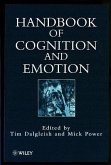Emotion Regulation and Well-Being Ivan Nyklicek, Ad Vinderhoets, and Marcel Zellenberg, editors Intimately involved in our behavior, cognitions, and interpersonal communications, emotions are basic building blocks of our existence. And it is increasingly understood that their regulation, whether adaptive or dysfunctional, is also intricately linked to the gamut of somatic and mental health issues. Emotion Regulation and Well-Being gathers experts from various branches of psychology, psychiatry, and neuroscience to review emerging and ongoing areas of interest for a lifespan approach to this complex topic. Its cutting-edge coverage is balanced between theoretical constructs and clinical concerns, to be as helpful to the reader interested in a deeper understanding of emotion expression in depression or new issues in repressive coping as to the one looking to add emotion regulation strategies to his or her clinical toolbox. Included among the book's features: .A biobehavioral perspective on coping styles and aggression. .Critical discussion of emotional intelligence in relation to children's health. .A personality-based classification model for alexithymia. .An attachment approach to crying in psychotherapy. .New findings on emotion inhibition in eating disorders. .A case study of in-patient treatment for trauma-related emotion regulation dysfunction. .Somatic insights into writing interventions. Emotion Regulation and Well-Being is a state-of-the-art reference for health and clinical psychologists, neuropsychologists, and psychiatrists. It is also comprehensive enough to be a useful postgraduate text in health psychology, psychosomatics, clinical psychology, and social psychology.
Dieser Download kann aus rechtlichen Gründen nur mit Rechnungsadresse in A, B, BG, CY, CZ, D, DK, EW, E, FIN, F, GR, HR, H, IRL, I, LT, L, LR, M, NL, PL, P, R, S, SLO, SK ausgeliefert werden.









